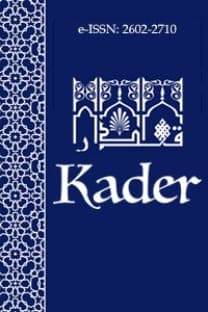Tanrı'nın Ölümü, Göçü, Geri Çekilmesi, Tutulması ve Unutulması Olarak Modern Tekno-Seküler Çağ
F. Hölderlin, şiirlerinde; “İlahi olan her şey hızla geçip gidiyor” 1 , “Eyvah! Neslimiz tanrısız karanlıkta yürür; Hadeste (cehennem) imiş gibi yaşar”2 der. K. Marx ; “Katı olan her şey buharlaşıyor; kutsal olan her şey dünyevileşiyor”3 demişti. Nietzsche de, Böyle Buyurdu Zerdüşt adlı kitabında maneviyatın/dinin kaybı ve sekülerleşmenin yaygınlaşmasını “Çöl büyüyor; vay haline çöl gizleyenin”4 demiş ve Şen Bilim adlı kitabında ise Hegel ’in daha önce değişik bir tarzda söylediği “Tanrı öldü” sözünü tekrarlamıştı. 5 Martin Buber, aynı temayı “Tanrı Tutulması” olarak nitelerken6 ; İngiliz şair T.S.Eliot, bu periyodu doğduğu coğrafya olan Batıya (özelde Londra) indirgeyerek, “Çorak Ülke” olarak niteler. 7 Bütün bu nitelemeler, Hegel’in “çağın nesnel ruhu” dediği şeye tekabül eder.
Anahtar Kelimeler:
Tanrı'nın, Ölümü, Göçü, Geri Çekilmesi
Modern Tecno-Secular Age Witnessing The Death, Migration, Regression, Eclipse and Disappearance of God
Soon after the enlightenment and industrial revolution mostly German speaking scholars spoke about a null and void world deprived of God and religion, transforming the world into a hornet’s nest. Have all these calamity cries been part of the West and Christendom or all-inclusive and worldwide? And much more important question remains: what was the reason for all these upheaval? My paper contends the backdrop rationale and reasons why the world was transformed into such a dreadful space Soon after the enlightenment and industrial revolution mostly German speaking scholars spoke about a null and void world deprived of God and religion, transforming the world into a hornet’s nest. Have all these calamity cries been part of the West and Christendom or all-inclusive and worldwide? And much more important question remains: what was the reason for all these upheaval? My paper contends the backdrop rationale and reasons why the world was transformed into such a dreadful space
Keywords:
Death of God, secularization, Christendom, industrial revolution,
- Başlangıç: 2003
- Yayıncı: Mehmet BULĞEN
Sayıdaki Diğer Makaleler
'Peygamberliğin Altmışta Bir Parçası': Yahudilikte Devam Eden Vahiy Sorunu
Bünyamin OKUMUŞ, Philips ALEXANDER
İnsan Tabiatı Bağlamında Kimlik ve Kişilik Kavramlarının İrdelenmesi
İDKAB Öğrencilerin Bireysel Yenilikçilik ve Ahlaki Olgunluk Düzeyleri Üzerine Kelam Dersinin Etkisi
Gazzali'nin Kelam Hakkında Son Sözü
Sibel KAYA, Muhammed ÇİFTÇİ, Fiazuddin ŞUAYB
LÜTUF KAVRAMI DOLAYIMINDA ŞÜKRÜN GEREKLİ ŞARTLARI ÜZERİNE FARKLI BİR BAKIŞ
Kelamcıların Problemleri Ele Alışında"Çevre" Unsurlarının Etkisi: "Elem Problemi Örneği"
Mehmet TOZLUYURT, El-iz ADİ'S-SELAM
İmâm Maturidî?nin Deist Eleştirilere Karşı Nübüvvet Savunusu
Gayb Meselesi ve İbn Berrecan'ın Keşfi Üzerine Bir Değerlendirme
